Parliament restoration plan could cost up to £5.7bn
- Published
Footage shows the extent of the Palace of Westminster's problems
Major restoration of the Houses of Parliament without moving MPs and peers out would cost £5.7bn and take 32 years, a report says.
If MP and peers were moved out for six years, the cost would drop to £3.5bn, an independent report has said, external.
The 150-year-old Grade I listed building is partly sinking, contains asbestos and has outdated cabling.
A 2012 report warned the building could suffer "major, irreversible damage" without significant restoration work.
The Commons and Lords will have to vote in the next few years on what to do.
Follow reaction to the report in Politics Live
The £3.5bn option would include some new features, such as a lift up the Elizabeth Tower, which with its famous clock and bell is popularly known as Big Ben, a media centre for TV interviews and "increased breakout, formal and informal meeting areas" for those who work in the Palace of Westminster.
Laura Kuenssberg's exclusive report from the Palace of Westminster in 2014
For a slightly higher spend of an estimated £3.9bn, the full move-out of MPs and peers would also enable a new visitor centre, including exhibition, education and conference facilities.
The Independent Options Appraisal report also has two halfway-house options, which would see a partial vacation of Parliament - with the Commons going first, followed by the Lords.
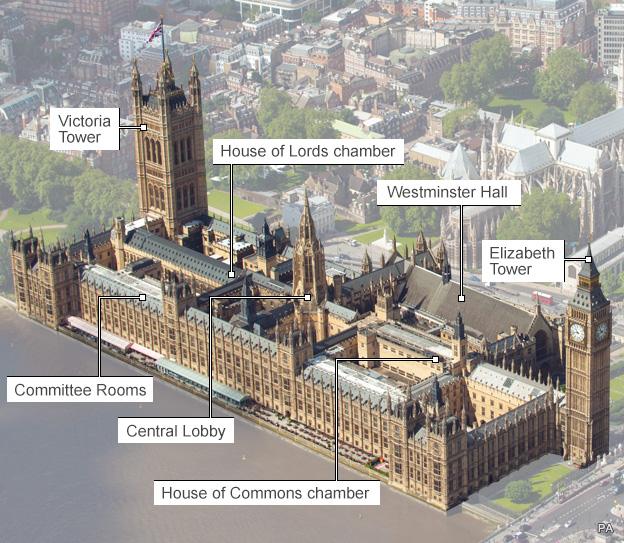
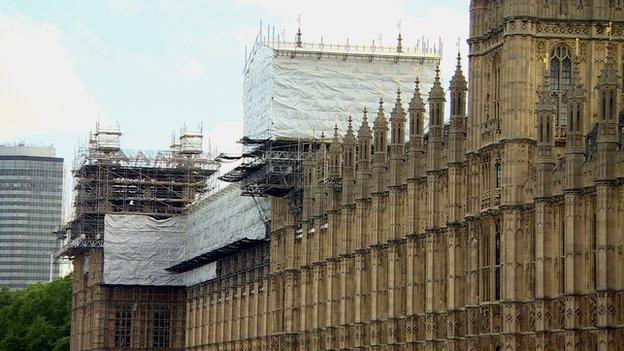
Repair work is regularly carried out at the building
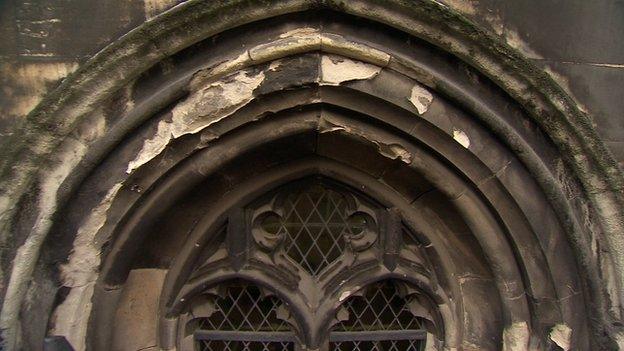
Parts of the stone facade on Westminster Hall's exterior are crumbling
That would cover a total time period of between nine and 14 years, but would most likely last 11 years.
Under that proposal, basic repairs - such as improving fire safety, removing asbestos and restoring damaged stonework - would cost an estimated £3.9bn.
A higher-spec version of the partial move-out, with some of the same extras as a full move-out, would cost an estimated £4.4bn.
The highest conceivable cost, the report said, would be £7.1bn. This assumes maximum risk and inflation levels and applies to the most expensive of the options put forward.
'Disturbance'
The report's summary says that it does not seek to advise Parliamentary authorities which option to choose, but concludes "a full move out is described as providing the best opportunity to mitigate risks, but the report recognises this would create logistical challenges".
If MPs and peers choose not to move out at all, the work is projected to last between 25 and 40 years, although it is suggested 32 years would be the most likely duration.

Relocation, relocation
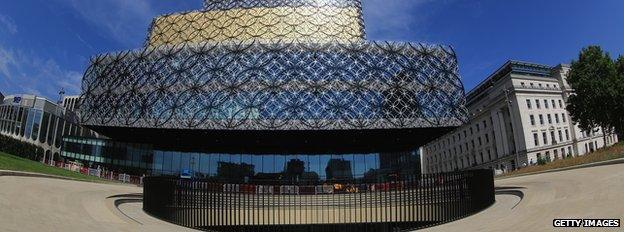
Some Birmingham MPs say the city's library should be used
Queen Elizabeth II Conference Centre: Westminster venue mooted as the likely front runner. Only two minutes' walk from Big Ben.
Olympic Park media centre: There is 1.2m sq ft of commercial space in the Olympic Park in Stratford, East London.
Birmingham Library: The preferred solution of some West Midlands MPs, the award-winning library was voted Britain's favourite new building for 2014 in a BBC online poll.
Manchester Town Hall: Already used as a double for Parliament in films, the grade one-listed building certainly looks the part.

The report warns that under such an option "users of the palace would have to tolerate high levels of disruption and disturbance over a long period".
Under all scenarios work would be unlikely to start before 2020.
Ideas for a new temporary home for MPs and peers include the Queen Elizabeth II Conference Centre or the Methodist Central Hall, both a few hundred metres from the Palace of Westminster on the other side of Parliament square.
But some MPs have been calling for a bolder move.
Labour's Frank Field said relocating Parliament to the North of England would "change the face of Britain as we know it".
'Leaning tower'
Another Labour MP, Graham Stringer went further, saying MPs should move permanently to another part of the country to make Britain a less centralised country.
But Conservative MP Sir Alan Duncan said that was a "ridiculous and impractical idea".

Analysis by BBC Parliamentary Correspondent Mark D'Arcy
Peers could shift to a temporary chamber on the Parliamentary estate (inside Westminster Hall, perhaps, or even in the vast atrium of Portcullis House) while MPs stay in their current chamber for a while, then move over to a newly revamped Lords Chamber.
That might add a bit to the cost and take 11 years to complete, but it would keep the MPs in their spiritual home…. sort of.
There is a genuine revulsion among the traditionalists, at the idea of forsaking the chamber where Churchill and Thatcher orated. Others compare that, with curled lips, to the stiff rear-guard action the traditionalists fought against the money-saving abolition of the practice of printing leather-bound compilation volumes of Hansard.

Michael Cockerell, who was given unprecedented access to the Palace of Westminster to film a recent BBC documentary series, said the building was infested with rats and mice and in an advanced state of disrepair, with its foundations in danger of sinking into the Thames.
"Big Ben is becoming slightly like the leaning tower of Pisa," he told BBC Radio 4's the World at One.
Restoration programme director Richard Ware said: "It is clear from this report that Parliament is faced with some difficult choices. The Palace of Westminster is a building of huge national and international importance and we face a massive challenge in securing its future.
"Parliament will now consider the recommendations of the Independent Options Appraisal and will do everything possible to secure value for money and ensure transparency throughout the process."
SNP MP Neil Gray said it was a "heavy ask" of taxpayers to cover the "eye-watering" renovation costs.
Mr Gray said it was a "golden opportunity" to change the way Parliament works, including moving it around the country, but this had been "squandered".

How do you think the money should be spent? What would you choose to do if you were an MP? Where do you think Parliament should be? You can send your comments by emailing haveyoursay@bbc.co.uk, external.
If you are available to speak to a BBC journalist, please include a contact telephone number.
You can send your photos and videos to yourpics@bbc.co.uk, external or text them to 61124 (UK) or +44 7624 800 100 (international) number. Alternatively you can send pictures via our WhatsApp number +44 (0)7525 900971. Or you can upload here, external.
- Published3 March 2015
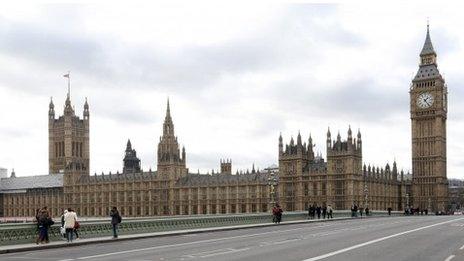
- Published20 November 2014
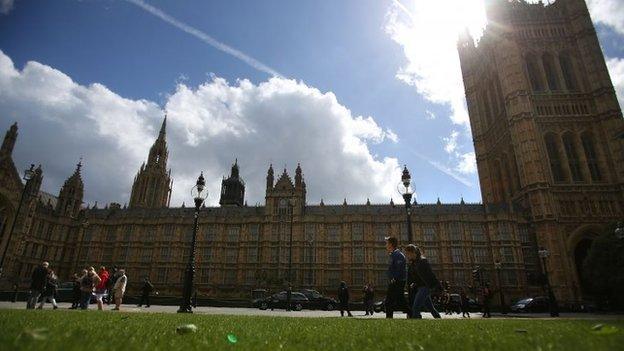
- Published29 May 2013
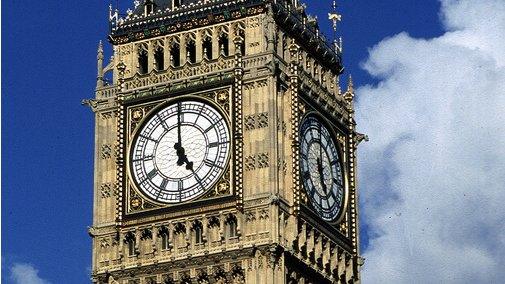
- Published30 October 2012